Bolhas de verdade: cinco alfinetes para (re)construir a democracia
Keywords:
post-truth, dystopia, post-modernism, populism.Abstract
In our article we seek to reflect on the implications of the word "post-truth" as a way of characterizing our societies suffering from a media, cultural, social and political malaise. We believe that the important research that has already been produced on this issue linking it to the media culture should extend its scope beyond the media in order to understand the unprecedented advance of populism and its formulas that support ultra-right movements which have resurface our democratic horizons. To this end, we consider five elements – what we call truth bubbles – to signal a number of perspectives which we consider critical to understand what is at stake.
References
Alvares, C. & Dahlgren, P. (2016). Populism, extremism and media: mapping an uncertain terrain. European Journal of Communication, 31(1), 46-57.
Atwood, M. (1985/2013). The handmaid’s tale. (trad. para língua portuguesa como A História de Uma Serva, ed. Bertrand). Toronto: Seal.
Baudrillard, J. (1991/1981). Simulacros e simulação. Lisboa: Relógio D’água.
Bauman, Z. (1999). Modernidade e ambivalência. Rio de Janeiro: Zahar.
Fallows, J. (2012). Bit by bit it takes shape: media evolution for the ‘post-truth’ Age. The Atlantic, Setembro, (4).
Fallows, J. (2017). With such a people you can then do what you please. The Atlantic, Fevereiro (21).
Foucault, M. (1976/2000). Truth and power. In J. D. Faubion (ed.), Power: essential works of Foucault, 1954-1984, vol. 3 (pp. 111-133). New York, NY: New Press.
Fraser, N. (2016). Progressive neoliberalism versus reactionary populism: a choice that feminists should refuse. NORA – Nordic Journal of Feminist and Gender Research, 24(4), 281-284.
Garcia, J. L. (2016). Introduction: towards a critical philosophy of networks – reflections on the perspective of Pierre Musso. In J. L. Garcia (org.), Pierre Musso and the network society. From Saint-Simonianism to the Internet. Springer.
Habermas, J. (1981). Modernity versus postmodernity. New German Critique, (22), 3-14.
Habermas, J. (2006). Political communication in media society: does democracy still enjoy an epistemic dimension? The impact of normative theory on empirical research”. Communication Theory, 16(4), 411-426.
Habermas, J. (2007). How to save the quality press?. Süddeutsche Zeitung, 16 May, (trad. para inglês disponível em: www.signandsight.com/features/1349.html)
Howell, E. H. (2009). Constructions and reconstructions: feminism, postmodernism, and the handmaid’s tale. Concept, [S.l.], 33.
Inglehart, R. & Norris, P. (2017). Trump and the xenophobic populist parties: the silent revolution in reverse. Perspectives on Politics, 15(2), 443-454.
Lyotard, J.-F. (1989). A Condição Pós-Moderna. Lisboa: Gradiva.
Milton, J. (1644/2009). Areopagítica. Discurso sobre a liberdade de expressão. Edições Almedina.
Musso, P. (2006). Ciberespaço, figura reticular da utopia tecnológica. In D. Moraes (org.), Sociedade midiatizada. Rio de Janeiro: Mauad.
Musso, P. (2016). Network ideology: from saint-simonianism to the internet. In J. L. Garcia (org.), Pierre Musso and the Network society from Saint-Simonianism to the Internet. Springer. Neuman, S. (2006). ‘Just a Backlash’: Margaret Atwood, feminism, and the handmaid’s tale. University of Toronto Quarterly, 75(3), 857-868.
Pariser, E. (2011). The filter bubble: how the new personalized web is changing what we read and how we think. Penguin Books.
Postman, A. (2017). My dad predicted Trump in 1985 – it’s not Orwell, he warned, it’s Brave New World. The Guardian, 2 fevereiro 2017.
Postman, N. (2005). Amusing ourselves to death: public discourse in the age of show business. 20 anv. ed. New York: Penguin.
Stein, K. (2001). Margaret Atwood’s modest proposal: the handmaid’s tale. In H. Bloom (ed.), Margaret Atwood’s the handmaid’s tale (pp. 127-140). Broomall: Chelsea House Publishers.
Sunstein, C. R. (2001). Republic.com. Princeton, NJ: Princeton University Press.
Susen, S. (2015). The ‘postmodern turn’ in the social sciences. New York: Palgrave Macmillan.
Therborn, G. (2003). Entangled modernities. European Journal of Social Theory, 6(3), 293-305.
Tolan, F. (2007). Margaret Atwood: feminism and fiction. Amsterdam: Rodopi.
Downloads
Published
Issue
Section
License
Estudos em Comunicação/Communication Studies is an Open Access journal. All its content is freely available without charge to the user or his institution. Users are allowed to read, download, copy, distribute, print, search, or link to the full texts of the articles in this journal without asking prior permission from the publisher or the author. Estudos em Comunicação, by Labcom, is licensed under a Creative Commons Atribuição-NãoComercial-SemDerivações 3.0 Unported License. By submitting your work to Estudos em Comunicação/Communication studies you confirm you are the author and own the copyright, that the content is original and previously unpublished, and that you agree to the licensing terms.


